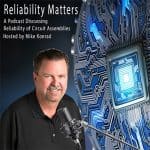
Reliability, Safety, and Human Impact: The DMR Approach with Dheeraj Narang
Today we’re exploring a concept that has deep roots in process safety and infrastructure management, but also has meaningful applications in electronics manufacturing: Damage Mechanism Reviews, or DMRs.
My guest today is Dheeraj Narang, a corrosion and reliability engineering specialist, process safety activist, and digital innovation researcher with an impressive track record across the energy sector.
Dheeraj has spent his career developing and implementing asset integrity programs for more than nine global energy companies across the U.S., India, and the Middle East.
He’s also a visionary advocate for using advanced technologies, industry best practices, and safety standards to uplift regions and workers where such systems are still under development.
Whether it’s through his service on global conference committees or his contributions to cutting-edge digital initiatives, Dheeraj is on a mission to blend technology, safety, and human rights into a unified vision of operational excellence.
In this episode, we’ll discuss:
What Damage Mechanism Reviews are and why they matter.
How DMRs tie into reliability programs like FMECA.
How DMR thinking could benefit industries outside of oil and gas—including electronics manufacturing
and how emerging technologies like AI and machine learning can amplify the impact of these reviews.
Whether you’re in energy, electronics, or any industry where reliability and safety are paramount, this is a conversation you won’t want to miss.
Dheeraj’s Contact Info:
dnarang1@my.harrisburgu.edu
 Ask a question or send along a comment.
Please login to view and use the contact form.
Ask a question or send along a comment.
Please login to view and use the contact form.